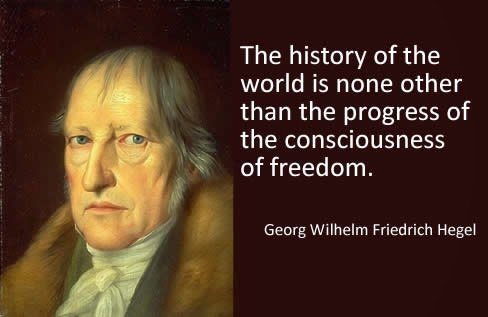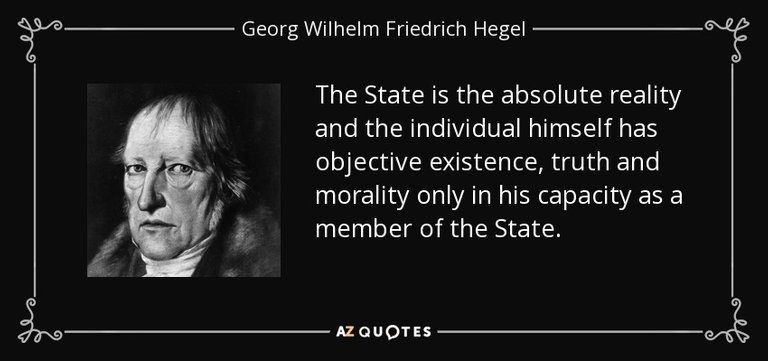Georg Wilhelm Friedrich Hegel (1770 – 1831) is one of Germany’s most influential philosophers. Merleau-Ponty once wrote that
all the great philosophical ideas of the past century – the philosophies of Marx and Nietzsche, phenomenology, German existentialism, and psychoanalysis – had their beginnings in Hegel.
Hegel believes that the development of freedom is the aim of history, and that man will only be free when he feels recognized and at home in a world that allows him to act in the interest of himself and simultaneously in the interest of everyone else in the world.
Hegel believes in a teleological end of history where we will eventually enter a kingdom of freedom that is ruled with divine reason. He writes that “[T]he state is absolutely rational” and that “[T]he state is the actuality of concrete freedom”. Only in that world are there no obstacles anymore that limit man in his self-realization.

Two important attributes of Hegel's ideal kingdom
Hegel stresses two important things about his ideal kingdom:
- Only a state can provide the space of law in which individuals can live in freedom;
- Without mutual recognition there can impossibly be a confirmation of what I am and hence I cannot truly feel at home in the world, nor be free.
This means that social and political institutions must acknowledge our needs as human beings and speak to those needs. In other words, Hegel believes that the individual can only achieve absolute freedom when he is positioned in particular societal contexts, described by Hegel in Sittlichkeit. In Sittlichkeit, absolute freedom is achieved through the unity of the self with the society while the society operates on an objective rationality.
Hegel moreover distinguishes subjective freedom from objective freedom. Subjective freedom is the freedom enjoyed by the individual who critically reflects on his subjective desires and satisfactions in his actions or determinations. The objectively free individual is one who has the right determinations that are prescribed by reason. The absolutely free individual possesses both subjective and objective freedoms. Both freedoms are existent in and can only be achieved through participation in Sittlichkeit.
Sittlichkeit
Sittlichkeit is described by David Rose (2007) as an ethical sphere that
incorporates those values and norms which govern the subject’s practical reasoning and pre-exist him, deriving from his role in and his being a member of a certain society.
The content of practical reasoning is embedded in customs in social institutions. A custom [Sitte] notably, is defined by Hegel not as a conduct created by the individual, but as one that has been habitually exercised by social groups and institutions such as the family or the state. Sittlichkeit is therefore a social or customary morality.
Hegel believes that customs are important for the right relationship between state and individual, and that they are necessary for the maintenance of the individual’s vitality. Sittlichkeit provides the virtues and duties by which individuals should live. It engages the following three elements:
- The needs and desires that individuals pursue;
- The safeguarding of individual freedom in the market place;
- The regulation of goods and practices in the market through police, courts and corporations.
According to Hegel, no one ever determines himself as a ‘person’ or agent, but always as a member of a historical ethical institution. It is within the social context we can become recognized as valuable and hence become fully human.
Sittlichkeit consists of three spheres:
- the family;
- the civil society;
- the state.

All three spheres allow individuals the following two things:
- Allowing individuals to operate on personal choices and to seek self-interests;
- Allowing individuals to recognize their actions properly as their own while contributing to the society’s good and to feel at home.
The family
Hegel writes that
[T]he family … is specifically characterized by love, which is mind’s feeling of its own unity.
Love is a feeling that overcomes the separation of the individual from his family unit. Hegel states:
[T]he first moment in love is that I do not wish to be a self-subsistent and independent person and that, if I were, then I would feel defective and incomplete. The second moment is that I find myself in another person.
Through love, the individual has renounced his independence and becomes certain of who he is. In the family, he is being recognized as irreplaceable and is endowed with a sense of his own importance. Hence, one achieves
in a family, … one’s individuality within this unity as the absolute essence of oneself, with the result that one is in it not as an independent person but as a member.
The family therefore frees the individual and makes him feel complete.
The civil society
Hegel asserts that
[T]he family is the first precondition of the state, but class divisions are the second. The importance of the latter is due to the fact that although private persons are self-seeking, they are compelled to direct their attention to others.
The civil society is built on the people’s necessities to satisfy their needs. The system is determined by desire itself rather than the content of these desires. The mutual benefits are the result of the individuals seeking personal prosperities. They are, albeit self-interested, united in a common market through trade and commerce. The desires of individuals are related in such a way that the market satisfies universal needs through the productive nature of the division of labour. It make interpersonal existence possible. Productive cooperation on the market frees the individual from subsistence living.
According to Hegel there are three classes in civil society:
- The agricultural class;
- The business class;
- The class of civil servants.
The agricultural and business class work for the interest of their own classes. The class of civil servants works for the universal interests of the community and
must therefore be relieved from direct labour to supply its needs, either by having private means or by receiving an allowance from the state which claims its industry.
The classes will over time form uniform values and tastes so that its members can recognize themselves in it. Along with the values come responsibility and duties for the protection of their classes. To ensure that the free market does not isolate individuals, an administration of justice and rational law must be put in place.
For Hegel, law is objectified customs and by taking the form of law, right steps into a determinate mode of being. It can be made actual and it can be recognized without the subjective feeling of private interest. It serves the universal good and it also requires the police to protect the laws for the sake of the community’s identity. The police should support the families to work for the general good and therefore has the right to provide public facilities for education, health services, and financial support. Nonetheless, Hegel is aware that the tasks that he entrusts the public authority with, can facilitate the concentration of disproportionate wealth in a few hands. When the share of wealth is not rightly balanced, it could lead to revolutions. In order to protect freedom and to prevent social nuisances, the civil community must acknowledge the universality of the state’s legislation and administration.
The state
According to Hegel, the state is the only means by which the society can be held subjected to the pursuit of the highest spirituality so that absolute freedom can be achieved for all. Hegel claims that
[T]he state in and by itself is the ethical whole, the actualization of freedom.
When discussing the state, Hegel is not referring to any existing states. He merely talks about the state in an ideal sense so there should be no misconception that none of our existing states are purely rational and have achieved absolute freedom.
In Lectures on the Philosophy of World History (1830), Hegel argues that
[F]or the everyday contingencies of private life, definitions of what is good and bad or right and wrong are supplied by the laws and customs of each state.
He furthermore states that
[T]he worth of individuals is measured by the extent to which they reflect and represent the national spirit.
However, Hegel makes clear that it is preposterous
to say that men allow themselves to be ruled counter to their own interests, ends, and intentions. Instead, men are directly linked to the ethical order by a relation which is more like an identity.
The state is therefore based on its people’s rationality and their conscious will to absolute freedom. It implies that the state is a natural extension of people's will and therefore non-coercive. The sovereign, according to Hegel, should hence be a monarch who is the embodiment of rationality, truth and constitutionality. In Hegel's ideal kingdom, he should act as the absolute decider and should be the personhood of all people.

Conclusion
Hegel's Sittlichkeit thesis can be attractive from an idealistic perspective, because it involves the community’s rationality and dialogue in order to give its members self-certainty so that no one is left out and everyone is included into a grander purpose in life. However, there is the danger that individual members are stripped from self-inventive powers, because they are pushed into moral directions by the customs of their communities - family, civil society, and the state. I believe that the individual should be fearful for moral conformism in Hegel’s Sittlichkeit as it negates individual autonomy. In addition, Sittlichkeit may restrain individuals in their self-invention.
In a future post, I will further explain the dangers of Hegel's Sittlichkeit thesis for personal autonomy and self-invention.
References
Dyde, S.W. (1894). Hegel’s Conception of Freedom.
Hegel, G.W.F. (1830). Lectures on the Philosophy of World History.
Knox, T.M. (1967). Hegel’s Philosophy of Right.
Rose, D. (2007). Hegel’s Philosophy of Right: a reader’s guide.
Inspiring!
Great article Chhay! Good series!
Thank you Rb24!
Whew, you had me going there @chhaylin, right up until your conclusion.
Modern civil servants in the US completely destroy any credibility Hegel had, they certainly do have the "relieved from direct labour" part perfected though.
My understanding, albeit only a recent grasp of it, ties the development of the Prussian school system to the breaking down of the State centered system Hegel seems to advocate.
Nice article
:)
Thanks, Lem!
Here we see again that people, also Hegel like to look things from the makro perspective to the micro perspective. The whole is the essence which all individuals should contribute to. And when they do this they overlook the individual. The individual with unique thoughts, capabilities, looks, etc.. All things that make us special
Great content
Thank you for your comment. :)
fantastic post, Hegel is the goat